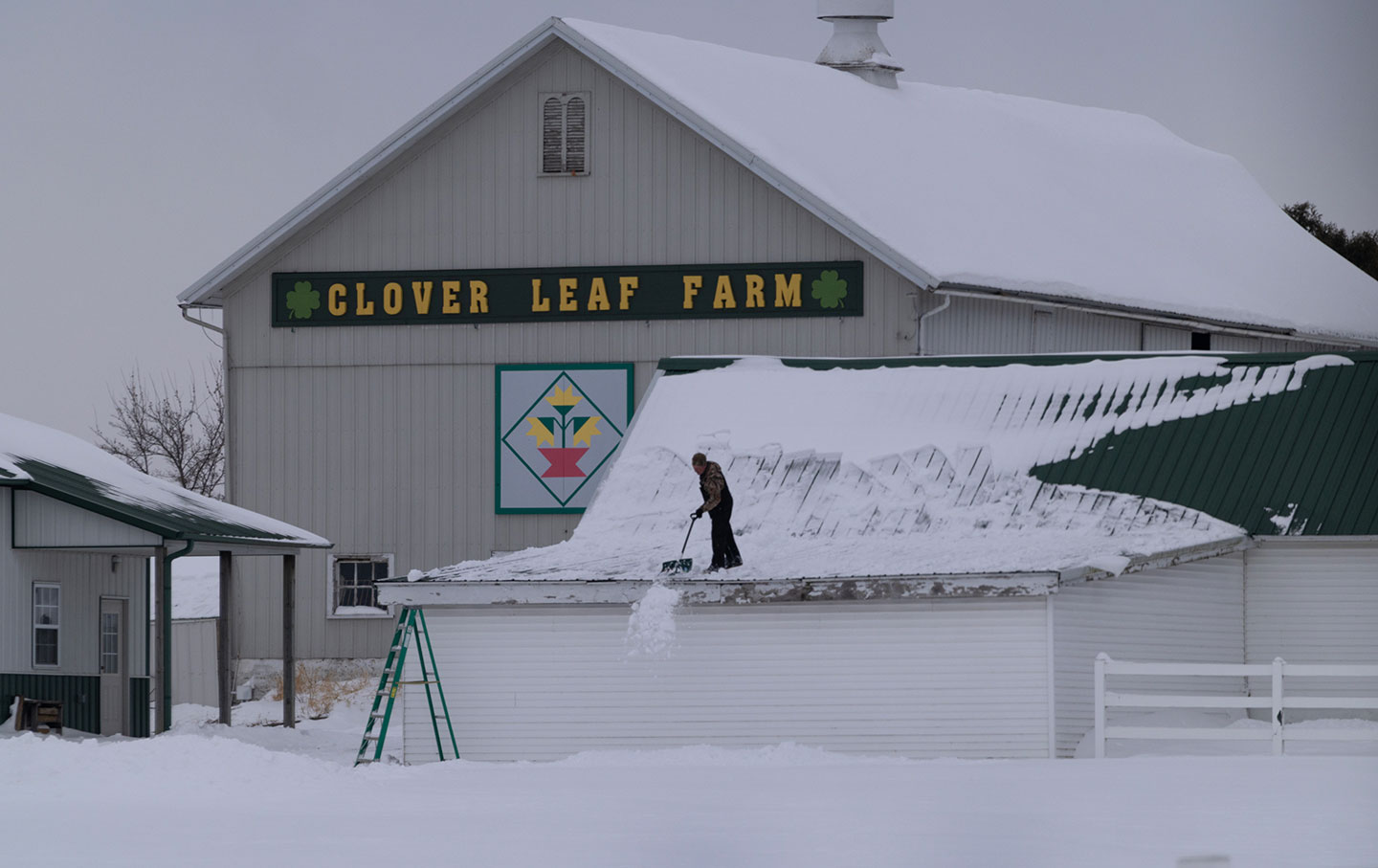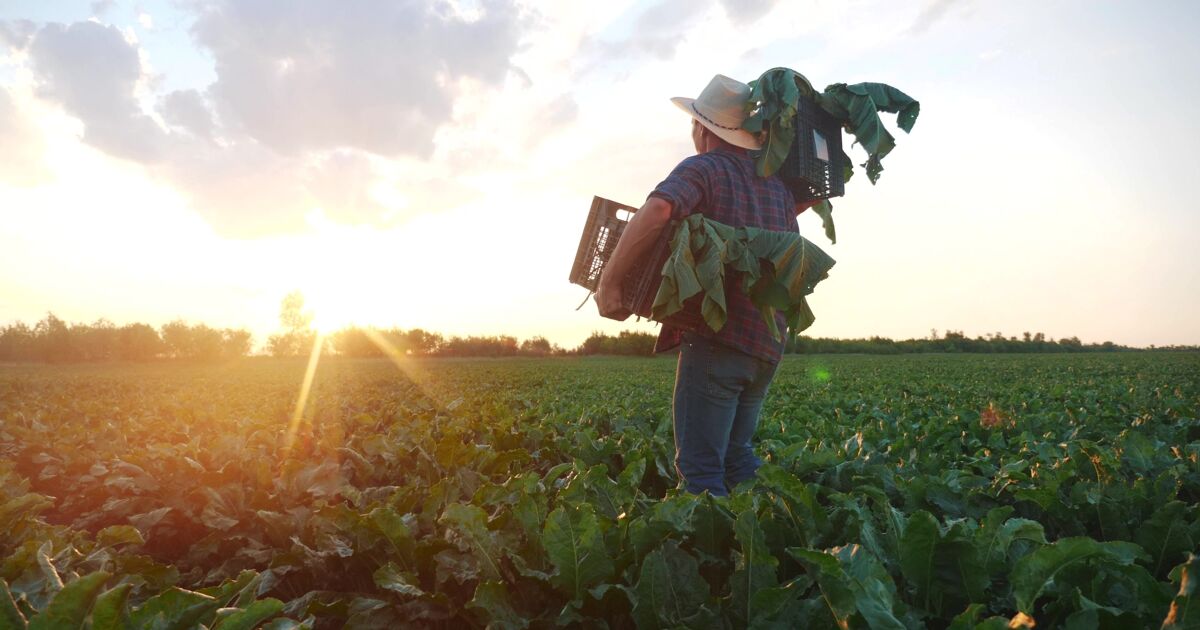#agriculture
#agriculture
[ follow ]
#tariffs #drought #eu-mercosur #trade-policy #protests #soybeans #ratification #mercosur #france #trade #food-labeling
fromState of the Planet
2 days agoCan Carbon Markets Offset the Emissions We Can't Eliminate?
Carbon markets are simultaneously promoted as an essential climate financing tool, and criticized as a license to pollute. A carbon market puts a price on greenhouse gas emissions via carbon credits that get bought and sold, almost like stocks. A credit represents one metric ton of CO 2 that has been avoided or removed through a specific project. A project could target emissions through agricultural practices, CO 2 capture or reforestation.
Environment
fromRealagriculture
1 week agoPerron moves on, as Bloc Quebecois taps new ag critic
The Bloc Quebecois has a new point person for agriculture. Sébastien Lemire, MP for the western Quebec riding of Abitibi-Témiscamingue, was named the party's critic for agriculture, agri-food, and supply management this week. He replaces Yves Perron, who has served as the party's ag critic and an active member of the House of Commons' agriculture committee going back to 2020.
Agriculture
fromwww.theguardian.com
1 week agoOuyen may have hit the highest recorded temperature in Victoria's history and some fear it could get even hotter
In the slanting, late-afternoon summer sun, the fields around the small Australian town of Ouyen almost 450km north-west of Melbourne turn the colour of honey. The edges shimmer with silver, that old cruel trick of feigning water where it hasn't rained for weeks. Summer is always hot out here in the sparse, flat Mallee, but this year is shaping up to be particularly harsh.
Agriculture
Environment
fromLos Angeles Times
1 week ago'Water bankruptcy' - U.N. scientists say much of the world is irreversibly depleting water
Excessive agricultural pumping is depleting rivers, lakes, and aquifers, driving many regions into irreversible water bankruptcy with severe economic and social consequences.
fromSocial Media Today
2 weeks agoMeta Announces Funding Grants for Research Into AI Glasses Use
There are two types of grants that U.S.-based organizations can apply for: Accelerator Grants for those who are already leveraging our AI glasses to scale their impact, and Catalyst Grants for organizations proposing new, high-impact applications using our Device Access Toolkit. We will award 15 Accelerator Grants of $25,000 and 10 of $50,000 USD, depending on the scale of the project. We'll also award five Catalyst Grants of $200,000. In total, we'll grant nearly $2 million to more than 30 organizations and developers.
Agriculture
fromIrish Independent
3 weeks agoEU member states confirm EU-Mercosur trade agreement as Irish farmers to stage protest in Athlone
The European Commission, which concluded negotiations a year ago, and countries such as Germany and Spain argue it is a vital part of an EU push to unlock new markets to offset business lost from U.S. tariffs and to reduce reliance on China by securing access to critical minerals. Opponents led by France, the European Union's largest agricultural producer, say the agreement will jack up imports of cheap food products, including beef, poultry and sugar, undercutting domestic farmers.
Miscellaneous
fromwww.theguardian.com
1 month agoWhen north and south winds collide, torrential rain falls in south-east Asia
January brings torrential rain to south-east Asia more than 250mm fell in just two days in Singapore last year. This is because of the monsoon, a pattern of wind and rainfall, the name of which stems from the Arabic word for season. The monsoon is sometimes described in terms of a sea breeze, in which the wind reverses direction in the morning and evening as the relative temperature of land and sea change, blowing out to sea at first and then inland as the land cools.
Environment
Agriculture
fromwww.theguardian.com
1 month agoThese trees may not survive': Jordan's ancient olive harvest wilts under record-breaking heat
Jordan's olive harvest has collapsed, with production down up to 70%, threatening livelihoods and national self-sufficiency amid low rainfall and rising temperatures.
Science
fromwww.theguardian.com
1 month agoDefunding fungi: US's living library of vital ecosystem engineers' is in danger of closing
The International Collection of Vesicular Arbuscular Mycorrhizal Fungi (INVAM), a unique global repository of AM fungi, faces imminent closure due to federal funding cuts.
fromBusiness Insider
1 month agoCommodities trades stung hedge funds this year. It's not stopping firms from piling in.
All strategies mix good days and bumper years with bad days and market-lagging returns. For commodities traders in 2025, it was more of the latter. Conflict in the Middle East caused volatility in oil prices. President Donald Trump's tariff policies, and their uneven implementation, led to fluctuations in the prices of crops, such as soybeans. The growing use of data centers by artificial intelligence giants has changed the outlook for electricity demand so drastically that even top investors in the space are unsure what the future holds.
Business
fromenglish.elpais.com
1 month agoWater, a ticking time bomb for Mexico
The Trump administration is pressuring Mexico with more tariffs to force its southern neighbor to settle its water debt of nearly one billion cubic meters, of which Mexico has committed to delivering 249 million before the end of January. Meanwhile, the high demand for water from the agricultural sector is forcing President Claudia Sheinbaum to perform a balancing act to avoid jeopardizing access to water for irrigation systems in the north of the country.
Environment
fromwww.theguardian.com
1 month agoWater levels across the Great Lakes are falling just as US data centers move in
The sign outside Tom Hermes's farmyard in Perkins Township in Ohio, a short drive south of the shores of Lake Erie, proudly claims that his family have farmed the land here since 1900. Today, he raises 130 head of cattle and grows corn, wheat, grass and soybeans on 1,200 acres of land. For his family, his animals and wider business, water is life.
Environment
fromLos Angeles Times
1 month agoSome big water agencies in farming areas get water for free. Critics say that needs to end
They said these "dirt-cheap" prices cost taxpayers, add to the strains on scarce water, and discourage conservation - even as the Colorado River's depleted reservoirs continue to decline. "Federal taxpayers have been subsidizing effectively free water for a very, very long time," said Noah Garrison, a researcher at UCLA's Institute of the Environment and Sustainability. "We can't address the growing water scarcity in the West while we continue to give that water away for free or close to it."
Environment
fromYanko Design - Modern Industrial Design News
1 month agoPUM Imagines a Soft Exoskeleton Posture Wearable for Young Farmers - Yanko Design
Most posture gadgets target office workers hunched over laptops, buzzing when your shoulders curl forward, or your neck drifts too far from neutral. Meanwhile, people doing physically demanding jobs, like young farmers, quietly rack up back pain and joint strain from long hours of bending, squatting, and lifting in fields. That strain is often treated as just part of the job until it becomes a serious problem threatening long-term health and livelihood.
Wearables
fromwww.bbc.com
2 months agoLib Dems call for farming equivalent of Teach First scheme
The Liberal Democrats are calling for a 'Farm First' scheme to train graduates for careers in farming, aiming to prevent what they describe as a "lost generation" in the sector. The scheme would be similar to Teach First, a charity which trains graduates as teachers and places them in schools. The party estimates their proposal would cost 60m per year, funding two-year training placements for 1,000 trainees.
UK politics
fromFortune
2 months agoWhy 90% of decisions don't reach this Land O' Lakes exec's desk | Fortune
Leah Anderson, a senior executive at Land O'Lakes, has learned to make high-stakes calls even when the data is incomplete. It's a discipline that's become foundational to her leadership, especially as AI and digital tools accelerate the speed at which farmers and retailers must act. She says the biggest risk for decision-makers in this space isn't making the wrong call-it's getting stuck.
Agriculture
fromFortune
2 months agoBrazil hails 'historic victory' after months of pressure as Trump removes 40% tariffs on coffee imports | Fortune
Cecafé, Brazil's coffee exporters council, called the tariff hike "a complete loss of competitiveness." "The tariff reversal comes after months of intense work representing the interests of Brazilian coffee. It is a historic victory for the entire coffee agribusiness production chain," the council said in a statement. Brazil has long been a key supplier of beef and coffee to the United States.
World news
Business
fromFortune
2 months agoThe Land O' Lakes exec bringing AI to the heart of American farming | Fortune
Leah Anderson leveraged non‑agricultural digital‑disruption experience to modernize Land O'Lakes' WinField United, applying technology and data to address agriculture's volatility and thin margins.
Miscellaneous
fromIrish Independent
2 months agoCar crash victim Alan McCluskey remembered as 'being made from everything good', as first of funerals takes place
Alan McCluskey, 23, was mourned at a packed Drumconrath funeral with tributes to his farming passion after a fatal two-car crash that killed five people.
fromBusiness Matters
2 months agoThe Steady Path: A Conversation with Alejandro Gomez Cobo
Working on the farm taught me patience and responsibility. We had more than 150 employees, so I learned quickly that leadership is about people. You need to listen, guide, and set an example. It wasn't glamorous work, but it gave me the foundation I still use today.
Startup companies
fromwww.dw.com
2 months agoGerman farmers venture into risky wetlands to cut emissions DW 11/17/2025
Anyone visiting farmer Henning Voigt's operation near Germany's Baltic Sea coast stands a good chance of getting their feet wet. About 25 years ago, his father began rewetting a once-drained peatland. "We've been an organic farm since 1996 and currently manage 350 hectares (864 acres) of grassland. Most of it is very wet," Voigt says. Speaking with DW, Voigt explains that the hay they harvest from these wet fields is burned in a power plant to produce district heating.
Environment
fromwww.aljazeera.com
2 months agoAs the dams feeding Tehran run dry, Iran struggles with a dire water crisis
Authorities are scrambling to provide drinking water across Iran, particularly in the capital, Tehran, as Iranians grapple with the effects of multiple ongoing crises. If there is no rain by next month, water will have to be rationed in Tehran; in fact, the city of 10 million may even have to be evacuated, President Masoud Pezeshkian said in a speech on Friday. While experts say evacuating the city is a last resort that will likely not come to pass, the president's stark warning is indicative of the mammoth burden facing the country of more than 90 million, its ailing economy reeling under sanctions.
Environment
US news
fromThe Mercury News
3 months agoBerkeley animal activist Zoe Rosenberg found guilty in 'chicken rescue' case tied to Petaluma Poultry
Zoe Rosenberg was convicted of conspiracy and misdemeanors for a 2023 Petaluma Poultry incursion and faces up to 4.5 years, with bail and court-imposed restrictions.
US politics
fromFortune
3 months agoAmerica's cattle chief rips into Trump's Argentine beef bailout, saying it 'does nothing to lower grocery store prices' | Fortune
Trump's proposal to buy Argentinian beef and expanded financial aid to Argentina alarm U.S. farmers who warn of market disruption, disease risk, and trade imbalance.
fromwww.pressdemocrat.com
3 months agoAbsolutely wonderful': Petaluma lavender farm brings joy to growers, visitors alike
When life gets stressful, one of the oldest tried and true remedies comes from the calming scent of flowers. Lavender is at the top of that list, and when it's an entire field of lavender it can waft our troubles away with both the sight and aroma. Petaluma residents can see and enjoy such a visage on Chapman Lane where the Lavender Bee Farm has been enchanting locals and international guests for many years.
Agriculture
Agriculture
fromFortune
3 months agoLand O Lakes CEO says 'we need more legal immigration' to help American farmers because a lack of labor could trigger a 'black swan event' | Fortune
American agriculture faces a severe labor shortage dependent on immigrant workers that threatens food production and economic stability without expanded legal immigration pathways.
Environment
fromwww.theguardian.com
3 months agoNew Zealand accused of full-blown climate denial' over cuts to methane reduction targets
New Zealand cut its 2050 methane reduction target to 14–24% versus 2017, drawing praise from farmers and sharp criticism from scientists and environmental campaigners.
fromwww.theguardian.com
3 months agoIt's a question of humanity': how a small Spanish town made headlines over its immigration stance
Flanked by farmland and nestled among the deep valleys of central Spain, few in Villamalea, a town of 4,200 people, expected to find their tranquil home splashed across Spanish media this summer. I've never been contacted by so many media outlets in my life, said Jose Nunez Perez, the conservative mayor of Villamalea. With a laugh, he added: It made me question, just what have we done here?
Miscellaneous
fromState of the Planet
3 months agoWhere Soil Meets Data: Yushu Xia's Mission To Support a Healthier Planet
From a young age, Yushu Xia was keenly aware of the importance of environmental health-a passion sparked by her grandfather, a geology professor and author of popular science books who inspired her love for science and education. Today, Xia combines these interests as an assistant research professor at Lamont-Doherty Earth Observatory, which is part of the Columbia Climate School. Xia's niche: the intersection of soil and agricultural science with modeling and data science, all of which are essential in "truly understand[ing] how soils function," she says.
Environment
Agriculture
fromwww.theguardian.com
4 months agoI couldn't look': European farmers on losing crops as the industry collides with worsening drought
Severe drought is devastating European farms, causing major yield losses, financial strain, asset sales, and rising economic damages projected to worsen with warming.
Environment
fromwww.mercurynews.com
4 months agoOpinion: Why AI is our best defense against invasive species
Artificial intelligence accelerates detection and containment of invasive species in California, preventing irreversible ecosystem damage and protecting agriculture, water infrastructure, and the broader economy.
Environment
fromwww.theguardian.com
4 months agoWeatherwatch: Flash droughts come on quickly but effects can wreak havoc
Flash droughts are rapidly developing, severe soil moisture losses that stress vegetation, increase wildfire risk, and require improved forecasting, water management, and irrigation.
fromMail Online
4 months agoClimate change 'could make the average person 24% poorer by 2100'
Climate change could push humanity into a dystopian nightmare of fires, biblical-scale floods and food shortages. But those lucky enough to survive the chaos could end up living amid a global economic meltdown. Scientists at the University of Cambridge warn that global warming could make the average person 24 per cent poorer by 2100. Life in Britain could resemble conditions in less developed countries, according to researchers - with higher unemployment, lower wages, closed businesses, and an even lower standard of living.
Environment
fromwww.aljazeera.com
4 months agoRestart from scratch': Flood-hit Indian farmers look at swelling losses
He saved a portion of that and used it to sow 3 acres (1.2 hectares) of paddy. He placed his bet on the high-yielding pearl variety of aromatic Basmati rice. A good sale would have given him an earning of nearly 1 million rupees per acre ($11,400 per 0.4 hectares). But now, Singh's pearl paddy grains lie submerged in floodwater, buried under layers of soil and sediment.
Agriculture
[ Load more ]



















.png?trim=0,200,0,200&width=1200&height=800&crop=1200:800)



